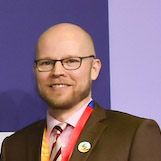COP28 was a source of hope, but the vulnerable communities cannot afford complacency
Attending the COP28 in Dubai for the first five days was encouraging for me because I witnessed how the global momentum is picking up in responding to the climate crisis, writes FCA’s Executive Representative Jussi Ojala.
FINN CHURCH AID has seen through its work the devastating effects of climate change and its consequences for vulnerable people and communities in least developed countries. East Africa witnessed five consecutive poor rainy seasons in 2020–2023, only to be followed by catastrophic flooding affecting Somalia, Kenya, and Ethiopia especially.
The consensus reached at COP28 in Dubai on climate action, including a pathway out of fossil fuels and tripling renewable energy use, is good news for the world. And there are more reasons for optimism. Attending the COP28 in Dubai for the first five days was encouraging for me because I witnessed how the global momentum is picking up in responding to the climate crisis. From FCA’s perspective, several important structural developments bring the most vulnerable and crisis-affected contexts to the radar of the climate debate – and the core competence of Finn Church Aid.
First, the pledging to the loss and damage fund to compensate for climate damage in particularly vulnerable countries, especially by the United Arab Emirates and Germany. This is a key step towards global climate justice and complements the Green Climate Fund and efforts led by the Republic of Korea.
Second, a series of pre-COP consultations were held with the religious leaders and faith communities, including a High-level Faith Leaders Meeting that contributed to the first ever Faith Pavilion at COP28. Religious leaders can not only show a moral compass to local communities but also provide leadership in policy influence and grassroots engagement and set an example through interfaith collaboration of how people from different backgrounds can join forces to address a global challenge.
Third, at COP28, a declaration on Relief, Recovery and Peace was issued, and there was a special day to deliberate on these critical themes specifically and their linkages to climate change. FCA and its local partners have too often borne witness to how climate change is hitting areas that are already under stress from conflicts and chronic development challenges, compounding the negative effects, inducing displacement, and contributing to refugee situations in developing and developed countries alike.
“Yet the pledges need to become reality, and issues such as sustainable climate financing need more resources.”
Fourth, never before has the Right to Quality Education been featured as prominently at the COP meetings as is the case in Dubai. The “Greening Education Hub” often served as my base during my stay, given the quality events that the NGOs, the UN and the various Governments were organizing. Yet more important than the events was the emerging will to consider climate change education, teacher capacities and vocational training through the lenses of needed climate action.
The COP Presidency promised an ambitious summit and it indeed delivered one. COP28 has the potential to write history in the global response to climate change. Yet the pledges need to become reality, and issues such as sustainable climate financing need more resources desperately. There is no room for complacency by the Conference of Parties and other stakeholders. Leaving no one behind must be our joint climate commitment and a promise we are keeping.
